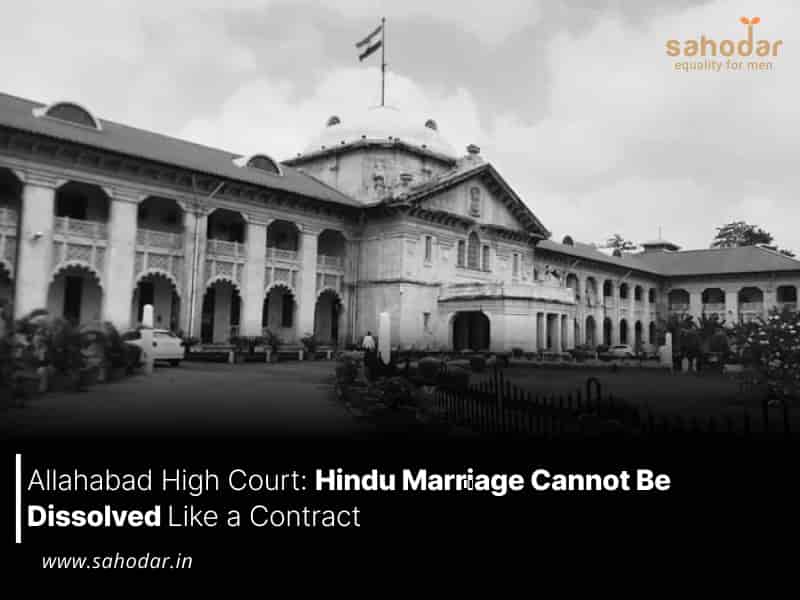The High Court criticised a family court’s decision to dissolve a Hindu marriage by adopting an oversimplistic approach.
The Allahabad High Court recently noted that a Hindu marriage cannot be dissolved or terminated in the same manner as a contract.
A bench comprising Justices Saumitra Dayal Singh and Donadi Ramesh made this observation while upholding an appeal filed by a woman challenging a family court’s decision to dissolve her marriage based on her husband’s petition.
The High Court overturned the family court’s ruling, emphasizing that a Hindu marriage, being sacramental in nature, can only be dissolved under specific conditions and after presenting sufficient evidence.
It requires no elaboration that a Hindu marriage is not to be dissolved or terminated as a contract. The sacrament based Hindu marriage may be dissolved (in law), in limited circumstances. In the first place, a Hindu marriage may be declared void on an allegation of impotency suffered by either spouse only on the strength of evidence led,” the Court said in its September 6 ruling.
The case involved a couple who married in 2006. The husband, an employee of the Indian Army, accused his wife of deserting him in 2007 and subsequently filed for divorce in 2008. He also alleged that she was infertile.
In her initial written statement in 2008, the wife had expressed her consent to the divorce.
However, in 2010, she filed a second written statement, contesting the divorce proceedings.
In her second statement, she refuted the infertility claim by providing documents to disprove the allegation. She highlighted that she had given birth to two children, one in 2008 (shortly after the divorce petition was filed) and another in 2010.
Her husband objected to the filing of this second statement. In March 2011, the family court upheld his objection and chose not to consider the wife’s 2010 statement.
On the same day, the family court proceeded to hear the case on its merits and granted the husband’s divorce petition.
The wife challenged this decision in the High Court.
The High Court overturned the family court’s ruling, noting that the case had not been considered comprehensively.
The Court stated that, while there are restrictions on filing a second written statement, the lower court was not prohibited from seeking additional statements to address the changed circumstances in this case.
The divorce suit having been instituted in the year 2008 and it having remained pending for three years, an over simplistic approach has been adopted-in relying only on the bald (first) Written Statement filed by the appellant (wife), and the consent dated 28.04.2008 … while ignoring subsequent developments,” the High Court observed.
The High Court determined that there was no “mutual” consent for divorce at the time the family court granted the divorce petition. While the wife had initially agreed to the divorce in 2008, she later withdrew her consent, as reflected in her oral testimony in 2011. The High Court emphasized that the trial court should have assessed whether the wife had indeed changed her position.
“The learned Court below has erred in blindly acting on the consent recorded on 28.4.2008 … Once the appellant claimed to have withdrawn her consent and that fact was on the record, it never became open to the learned court below to act on that (withdrawn) consent, belatedly,” the High Court held.
The Bench expressed a willingness to assist the estranged spouses in resolving their differences, but was unable to proceed as the husband was not present in court.
The High Court ultimately allowed the wife’s appeal, setting aside the divorce decree, and directed the trial court to reconsider the case in accordance with the law.
“If no mediation may arise or be successful, necessarily the appellant (wife) may be allowed to rely on the second Written Statement … with corresponding right to the respondent (husband) to file Replication Statement,” the Court added.

